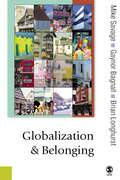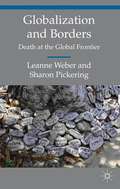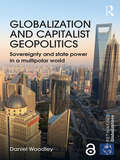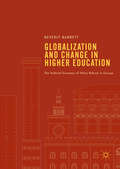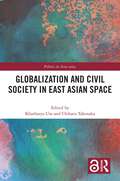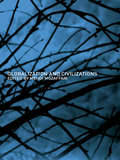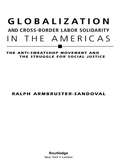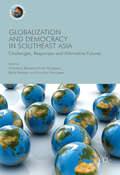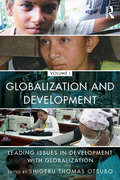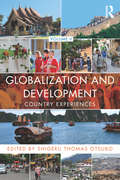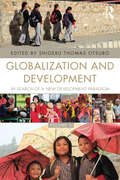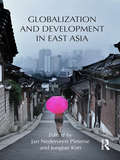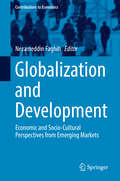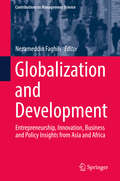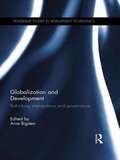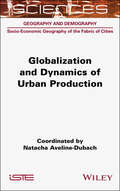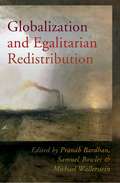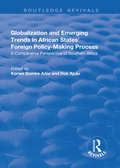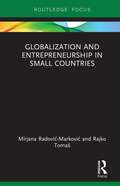- Table View
- List View
Globalization and Belonging (Published in association with Theory, Culture & Society)
by Mike Savage Gaynor Bagnall Brian Longhurst'Globalization and Belonging's headline message - that place matters, that locality remains vital to people, is arresting' - Frank Webster, Professor of Sociology, City University, London Drawing on long-term empirical research into cultural practices, lifestyles and identities, Globalization and Belonging explores how far-reaching global changes are articulated locally. The authors address key sociological issues of stratification as analysis alongside 'cultural' issues of identity, difference, choice and lifestyle. Their original argument: " Shows how globalisation theory conceives of the 'local' " Reveals that people have a sense of elective belonging based on where they choose to put down roots " Suggests that the feel of a place is much more strongly influenced by the values and lifestyles of those migrating to it " reinvigorates debates in urban and community studies by recovering the 'local' as an intrinsic aspect of globalisation Theoretically rigorous, the book is brought to life with direct quotations from the authors' research, and appeals to students in urban sociology, urban geography, media studies and cultural studies.
Globalization and Borders
by Sharon Pickering Leanne WeberThis book analyzes the political and material conditions driving contemporary border control policies and discusses the processes that mediate popular and official understandings of border-related fatalities.
Globalization and Capitalist Geopolitics: Sovereignty and state power in a multipolar world (Rethinking Globalizations)
by Daniel WoodleyGlobalization and Capitalist Geopolitics is concerned with the nature of corporate power against the backdrop of the decline of the West and the struggle by non-western states to challenge and overcome domination of the rest of the world by the West. This book argues that although the US continues to preside over a quasi-imperial system of power based on global military preponderance and financial statecraft, and remains reluctant to recognize the realities global economic convergence, the age of imperial state hegemony is giving way to a new international order characterized by capitalist sovereignty and competition between regional and transnational concentrations of economic power. This title seeks to interrogate the structure of world order by examining leading approaches to globalization and political economy in international relations and international political economy. Breaking with the classical school, Woodley argues that geopolitics should be understood as a transnational strategic practice employed by powerful state actors, which mirrors predatory corporate rivalry for control over global resources and markets, reproducing the structural conditions for corporate power through the transnational state form of capital. In a period of increasing geopolitical insecurity and economic instability this title provides an authoritative yet accessible commentary on debates on capitalism and globalization in the wake of the financial crisis. It is valuable resource for students and scholars seeking to develop a deeper understanding of the historical determinants of the changing dynamics of neoliberal capitalism and their implications for world order.
Globalization and Change in Higher Education
by Beverly BarrettThis book sets out political economy explanations for higher education policy reform in Europe in the initial decades of the 21st century. With a sustained focus on the national level of policy implementation, institutional change is considered in relationship to broader trends in economic development and globalization. Since the concept of a "Europe of Knowledge" was presented by the European Commission in 1997, the pursuit of global competitiveness sets the context for the international initiative of the Bologna Process that has created the European Higher Education Area (EHEA). Growing from 29 to 48 participating countries, there are three core explanations for change in the policy process: globalization (economic), intergovernmentalism (political), and Europeanization (social). As part of multi-method research analysis, this book presents qualitative case studies on Portugal and Spain to consider points of comparison, including national governance history and modernization of higher education institutions. The structure of government in these countries affects the policy reforms. Ultimately, the Bologna Process serves as a model for integration of higher education reform in other world regions. This book is essential reading for students, researchers, and policy makers in the fields of education, economics, and public policy.
Globalization and Civil Society in East Asian Space (Politics in Asia)
by Khatharya Um Chiharu TakenakaThis book critically examines the impact of globalization, changing power dynamics, migration, and evolving rights regimes on regional order, discourse of national governance, state and society relations, and the development of civil society in East Asia. Providing a textured, critical reading of East Asia as an economically, socially, and politically dynamic region, this book also presents the region as one shaped simultaneously by progressive as well as regressive pulls. Attentive to prevailing issues as well as to states’ and civil societies’ responses to them, it focuses on changing societies and politics in East Asia, particularly on shifting notions of citizenship, nationhood, and peoplehood. The contributions feature new and timely conclusions drawn from multidisciplinary fields including law, public policy, sociology, Asian studies, gender, sexuality, and ethnic studies and include direct testimonies from citizens of East and Southeast Asia. Globalization and Civil Society in East Asian Space will appeal to students and scholars of sociology, political science, and Asian studies more broadly.
Globalization and Civil Society in East Asian Space (Politics in Asia)
by Khatharya Um Chiharu TakenakaThis book critically examines the impact of globalization, changing power dynamics, migration, and evolving rights regimes on regional order, discourse of national governance, state and society relations, and the development of civil society in East Asia.Providing a textured, critical reading of East Asia as an economically, socially, and politically dynamic region, this book also presents the region as one shaped simultaneously by progressive as well as regressive pulls. Attentive to prevailing issues as well as to states’ and civil societies’ responses to them, it focuses on changing societies and politics in East Asia, particularly on shifting notions of citizenship, nationhood, and peoplehood. The contributions feature new and timely conclusions drawn from multidisciplinary fields including law, public policy, sociology, Asian studies, gender, sexuality, and ethnic studies and include direct testimonies from citizens of East and Southeast Asia.Globalization and Civil Society in East Asian Space will appeal to students and scholars of sociology, political science, and Asian studies more broadly.
Globalization and Civilizations
by Mehdi MozaffariGlobalization and Civilizations challenges established assumptions about the nature of civilizations and the supposed inevitability of the conflict between the Islamic and Western worlds. Uniquely, this edited book critically interrogates the concept of 'civilization' by asking whether it is still valid in the globalized world economy of the twenty-first century. The first half of the book provides an historical and theoretical context to understand the idea of 'civilization' in political science and demonstrates how the various social, economic, political and cultural processes of globalization have radically altered perceptions of civilization. The second half of the book looks particularly at non-Western examples of the interaction between globalization and civilization and includes case studies on the Arab world, Islam, China, India and Europe
Globalization and Conflict: National Security in a 'New' Strategic Era (Contemporary Security Studies)
by Robert G. PatmanThis volume highlights the gap between the new security environment and the notion of state-centred national security favoured by Washington, showing how a Cold War phenomenon known as the national security state, in which defence and foreign policy interests essentially converge, remains largely intact. The conventional wisdom since the suicide attacks of 9/11 is that the world has been transformed and, according to President Bush, "September 11 changed the strategic thinking" of the US. This book challenges these assumptions. Indeed, the Bush administration’s National Security strategy of 2002 has reinvigorated and even extended the idea of national security. Paradoxically, the renewed emphasis on a distinctly state-centred approach to security, including the War on Terror, has unfolded during an era of deepening globalization. Drawing on the international expertise of fourteen specialists, the book examines four inter-related themes: the impact of globalization on the concept of security the strategic outlook of the world’s only superpower, the US the new conflicts that have come to characterize the post-Cold War era efforts to regulate the emerging patterns of conflict in the world. Globalization and Conflict will be essential reading for students of strategic studies, security studies and international relations.
Globalization and Contestation: The New Great Counter-Movement (Rethinking Globalizations)
by Ronaldo MunckGlobalization is undoubtedly the great overarching paradigm of our era. However, there is still little agreement on what globalization actually ‘is’ and some do not accept that it ‘is’ anything at all. This new book addresses the contestation of globalization by the anti- or counter-globalization movement. To contest means to challenge, to call into question, to doubt, to oppose and to litigate. This study shows how globalization is ‘contestable’ in many different ways and how the counter-movements we have seen emerging over the last decade also ‘bear witness’ on behalf of an alternative human future. Ronaldo Munck presents an overarching framework that allows us to understand how globalization and its contestation are inextricably bound up with one another. This volume insightfully explores a number of case studies, including: the battle of Seattle in 1999 the World Social Forum peasant internationalism environmental movements and reactionary movements including: the US Patriot's movement, Islamic fundamentalist movements and other nationalist movements. Globalization and Contestation will be of great interest to all students and scholars of international relations, politics and of globalization and global governance in particular.
Globalization and Cross-Border Labor Solidarity in the Americas: The Anti-Sweatshop Movement and the Struggle for Social Justice
by Ralph Armbruster-SandovalFirst published in 2005. Routledge is an imprint of Taylor & Francis, an informa company.
Globalization and Culture: Global Melange
by Jan Nederveen PieterseIs there cultural life after globalization? Jan Nederveen Pieterse argues that what is taking place today is a global melange, a culture of hybridization.
Globalization and Democracy in Southeast Asia
by Chantana Banpasirichote Wungaeo Boike Rehbein Surichai Wun'GaeoThis book questions why Southeast Asian nation states are struggling to adopt full-fledged liberal democracy and attempts to better understand the relationship between globalization and models of democracy. Country studies are covered mostly by native Southeast Asian scholars who analyse recent developments as well as specific concerns that have arisen from political crises, citizen uprisings, ethnic identity politics, political reforms, social justice and inequality, and the persistence of the political elite. The collection highlights factors which have impacted the different regional and national paths taken such as: the legacy of the Cold War, rapid economic development and liberalization, external economic globalization, the important role of informal politics, powerful elites, and weak but emerging middle classes. This book will be of interest to scholars and students of regional studies of Southeast Asia, Democracy, Sociology, Politics and Globalization Studies.
Globalization and Development Volume I: Leading issues in development with globalization
by Shigeru Thomas OtsuboGlobalization and Development is a "cross-national study" on the "interstate dispersion" of the impacts (on growth, inequality and poverty) that international economic integration provides to the economies of the developing countries. In order to present the "Leading Issues in Development with Globalization" in a balanced manner, to identify differences and commonalities among "Country Experiences" in development with globalization, and to introduce diversified development paradigms with forward looking discussions "In Search of a New Development Paradigm" for the post-MDGs era, this publication consists of three volumes and four main parts. Volume I (Part I) introduces the evolution and facets of globalization, and the challenges that we face in our development eff orts under globalization. Findings from the old and new empirical studies are consolidated for us to answer the following question. What do we really know about the impacts of globalization? Volume I (Part II) contains thematic and issue-oriented discussions on the key facets of globalization. This book intends to serve as a unique and comprehensive guide for those in the international development community on the subjects of diversified development paradigms/paths under globalization and other challenges in the post-MDGs era.
Globalization and Development Volume II: Country experiences
by Shigeru Thomas OtsuboGlobalization and Development is a "cross-national study" on the "interstate dispersion" of the impacts (on growth, inequality and poverty) that international economic integration provides to the economies of the developing countries. In order to present the "Leading Issues in Development with Globalization" in a balanced manner, to identify differences and commonalities among "Country Experiences" in development with globalization, and to introduce diversified development paradigms with forward-looking discussions "In Search of a New Development Paradigm" for the post-MDGs era, this publication consists of three volumes and four main parts. Volume II (Part III) presents the country case studies of Bhutan, China, Indonesia, Japan, Thailand, Vietnam, and Ghana, with their respective experiences of development under globalization. An additional chapter that describes the overall African experience under globalization is included, reflecting the recent emergence of Africa as the global target of investment. This book intends to serve as a unique and comprehensive guide for those in the international development community on the subjects of diversified development paradigms/paths under globalization and other challenges in the post-MDGs era.
Globalization and Development Volume III: In search of a new development paradigm
by Shigeru Thomas OtsuboGlobalization and Development is a "cross-national study" on the "interstate dispersion" of the impacts (on growth, inequality and poverty) that international economic integration provides to the economies of the developing countries. In order to present the "Leading Issues in Development with Globalization" in a balanced manner, to identify differences and commonalities among "Country Experiences" in development with globalization, and to introduce diversified development paradigms with forward-looking discussions "In Search of a New Development Paradigm" for the post-MDGs era, this publication consists of three volumes and four main parts. Volume III (Part IV) presents the diversified development paradigms such as the GNH (Bhutan), the sufficiency economy (Thailand), the reform and opening up paradigm (China), the African and Latin American paradigms, and the Islamic development paradigm. The Concluding Chapter presents the evolution of development paradigms in the global development cooperation community after World War II, and then offers a glimpse into new development paradigms for the post-MDG era. This book intends to serve as a unique and comprehensive guide for those in the international development community on the subjects of diversified development paradigms/paths under globalization and other challenges in the post-MDG era.
Globalization and Development in East Asia (Routledge Studies in Emerging Societies #2)
by Jan Nederveen Pieterse Jongtae KimEast Asia is widely regarded as the main "winner" in contemporary globalization, unscathed by the economic crisis of 2008, with its leading new industrializing nations and emerging economies. While 20th-century globalization was mainly led by the West, the 21st century is ushering in different dynamics. The re-emergence of Asia involves alternative visions of the world and different perspectives on globalization. This volume seeks to address these dimensions, turning to local reflexivities, notably in South Korea and China, to explore the key debates in sociology and political economy within East Asia rather than from an outside view.
Globalization and Development: Economic and Socio-Cultural Perspectives from Emerging Markets (Contributions to Economics)
by Nezameddin FaghihThis book presents economic and socio-cultural perspectives on globalization from emerging markets. It explores the links between globalization and development, and reveals the dynamics, strengths and weaknesses, trends in and implications of globalization in emerging market economies. Gathering papers by leading experts in the field, it shares essential insights into the history and status quo of globalization processes and structures; identifies the opportunities provided by and risks posed by globalization; and sheds light on the way to global peace. The topics addressed range from globalization development within the Group of Twenty (G20), populist events such as “Brexit” as a form of historical irony, and a zeitgeist analysis of the globalization spirit; to the evolution of higher education and public administrative systems under the weight of globalization; not to mention emerging topics such as the informal economy and new rules for fleecing the South in the newly globalized trade system.
Globalization and Development: Entrepreneurship, Innovation, Business and Policy Insights from Asia and Africa (Contributions to Management Science)
by Nezameddin FaghihOver time, globalization has evolved into a shared journey of humanity, involving entrepreneurship, innovation, business and policy advances around the world. This book explores the link between globalization and development, and reveals the dynamics, strengths and weaknesses, trends in and implications of globalization in Asia and Africa. Presenting papers by respected experts in the field, it shares essential insights into the status quo of globalization processes and structures, identifies the opportunities and threats that globalization faces, and sheds light on the path to global peace. Topics range from using fair-trade practices to compensate for the impacts of globalization; to lessons learned for tomorrow from Tunisia, Morocco and Jordan; as well as emergent topics such as global entrepreneurship capacity and developing the Chinese economy overseas.
Globalization and Development: Rethinking Interventions and Governance (Routledge Studies in Development Economics #102)
by Arne BigstenThe key challenge for achieving sustained development in developing countries relates to quality of domestic governance, which in turn is strongly affected by external interventions. Domestic governance includes politics, policy formulation, institution building and policy implementation. It is important for both international and domestic agents to understand how the interplay between external interventions and domestic governance affects social and economic outcomes. This volume presents a series of studies analysing the links between external interventions and domestic governance in the areas of economic, social and security policy. Key questions that are addressed here include: How do external interventions in economic, social and security areas affect domestic governance in developing countries? Is aid more effective in decentralised systems of government? What are the interactions between external interventions and domestic governance? How can external agents advance domestic governance? Due to its strong focus on external interventions and domestic governance, this book will be of interest to scholars of development studies across the social sciences, in addition to the fields of economics, political science, sociology and geography.
Globalization and Diversity: Geography of a Changing World (Second Edition)
by Lester Rowntree Martin Lewis Marie Price William WyckoffGlobalization and Diversity is an exciting contemporary approach to World Regional Geography that explicitly acknowledges the geographic changes that accompany today's rapid rate of globalization. Organizes each regional chapter into five thematic sections: Environmental Geography; Population and Settlement; Cultural Coherence and Diversity; Geopolitical Framework; Economic and Social Development.
Globalization and Dynamics of Urban Production
by Natacha Aveline-DubachOver the last 20 years, urbanization processes have undergone profound transformations under the growing influence of private actors, particularly in the financial sector. This has exposed the physical environment of various cities to global capital flows, which has generated an overall rise in real estate values on a global scale. This is often disconnected from the financial capacities of local actors – primarily households – which then increases the inequalities and vulnerabilities of societies regarding financial and environmental risks. This book offers the keys to understanding these new dynamics of capital accumulation in the general built-up environment of cities by taking into account the diversity of their configurations, their intensity and their urban effects according to national contexts. Beyond the cases involving the major Western countries, the initial centers of the financial industry and the theorizations on the urban, this book addresses the particular contexts of real estate production in four major regions: Northeast Asia, Southeast Asia, the Middle East and West Africa.
Globalization and Egalitarian Redistribution
by Pranab Bardhan Samuel Bowles & Michael WallersteinCan the welfare state survive in an economically integrated world? Many have argued that globalization has undermined national policies to raise the living standards and enhance the economic opportunities of the poor. This book, by sixteen of the world's leading authorities in international economics and the welfare state, suggests a surprisingly different set of consequences: Globalization does not preclude social insurance and egalitarian redistribution--but it does change the mix of policies that can accomplish these ends. <P><P>Globalization and Egalitarian Redistribution demonstrates that the free flow of goods, capital, and labor has increased the inequality or volatility of labor earnings in advanced industrial societies--while constraining governments' ability to tax the winners from globalization to compensate workers for their loss. This flow has meanwhile created opportunities for enhancing the welfare of the less well off in poor and middle-income countries. Comprising eleven essays framed by the editors' introduction and conclusion, this book represents the first systematic look at how globalization affects policies aimed at reducing inequalities. The contributors are Keith Banting, Pranab Bardhan, Carles Boix, Samuel Bowles, Minsik Choi, Richard Johnston, Covadonga Meseguer Yebra, Karl Ove Moene, Layna Mosley, Claus Offe, Ugo Pagano, Adam Przeworski, Kenneth Scheve, Matthew J. Slaughter, Stuart Soroka, and Michael Wallerstein.
Globalization and Emerging Trends in African States' Foreign Policy-Making Process: A Comparative Perspective of Southern Africa
by Rok AjuluThis title was first published in 2002: The resurgence of the democratization movement in Africa in the post-Cold War era is gradually replacing authoritarianism with forms of democratic systems. These changes have put into question the traditional big man image of African states’ foreign policy and foreign policy-making. The first book of its kind to focus on the foreign policy-making process of Southern African countries in the era of globalization, these instructive and rewarding case studies contextualize the increasing involvement of other internal actors in African states foreign policy-making process. Foreign policy actors such as the Presidency, Ministries of Defence, Foreign Affairs, Trade, Finance and the Intelligence Community, among others, are examined in a comparative perspective.
Globalization and Entrepreneurship in Small Countries (Routledge Focus on Business and Management)
by Mirjana Radović-Marković Rajko TomašThe changeable business environment requires a new business framework and an understanding of the global market trends and the culture that will impact on business. Globalization and Entrepreneurship in Small Countries considers important business principles and makes them accessible for entrepreneurs and small business owners. It addresses the role of managers and leaders and management techniques in the context of global strategy of companies, as well as the culture diversity that comes with globalization of organizations. To meet the constantly changing conditions and demands, business must transcend boundaries to get what it needs regardless of where it exists – geographically, organizationally, and functionally. This book draws together earlier literature on SME development and internationalization from disparate sources into a cohesive body of work, which traces the evolution of our understanding of the topic. It explores just how globalization affects the demand for business and entrepreneurship, and will therefore be of interest to researchers, academics, policymakers, and students in the fields of entrepreneurship, globalisation, organisational studies, and SMEs development in small countries.
Globalization and Environmental Reform: The Ecological Modernization of the Global Economy
by Arthur P. J. MolMany writers either glorify globalization or vilify it, particularly for its destructive environmental effects. In this book environmental sociologist Arthur Mol provides a more balanced understanding of the relationship between globalization and environmental quality. Mol bases his arguments on his theory of ecological modernization, which holds that although processes of modernization and globalization often result in environmental degradation, they also can encourage policies and programs designed to arrest degradation and improve environmental quality. Building on earlier ecological modernization studies that focused on Europe, North America, and East and Southeast Asia, Mol takes here a more global perspective. He also addresses the increasing roles of nonstate actors, especially international institutions, nongovernmental organizations, popular movements, and transnational corporations. After examining the confusion created by the failure to distinguish among globalization, global capitalism, and neoliberalism, Mol analyzes both globalization's destructive environmental consequences and its contribution to global environmental reform. Elaborating on the subject of reform, he focuses on three case studies, one involving the economic triad of the European Union, the NAFTA region, and Japan; one involving the relationship between the triad and developing countries; and one involving three developing countries: Vietnam, the Netherlands Antilles, and Kenya.
